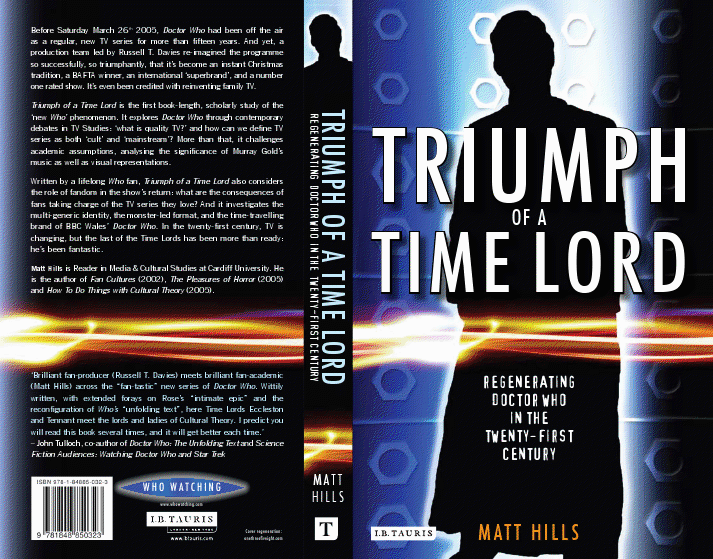





Matt Hills: Part 1
Exclusive Interview with Dr. Matt Hills
Academic, Writer & Lifelong Fan of Doctor Who
This interview is Strictly Copyright © doctorwhotoys.net, All Rights Reserved; may not be reproduced in full or part.
Doctor Matt Hills has been a fan of Doctor Who for over thirty years. He is the author of 'Fan Cultures' (2002), The Pleasures of Horror (2005) and How To Do Things with Cultural Theory (2005). Dr. Matt Hills is currently Reader in Media and Cultural Studies at Cardiff University. His latest work 'Triumph of a Time Lord: Regenerating Doctor Who in the Twenty First Century' will be out later this year (2009).

The final approved cover for Matt Hills Triumph of a Time Lord
 How did you first become interested in Doctor Who? And when and how did you get into it as a subject for academic study?
How did you first become interested in Doctor Who? And when and how did you get into it as a subject for academic study?
 I've been a fan as long as I can remember, really. Apparently I watched the series with my Dad from the age of about three or four, and was captivated by it, but I can only personally recall watching from about 1976 onwards (when I was five years old). So when I got into the show, it was Tom Baker and Lis Sladen. I stuck with it through thick and thin from there on, joining DWAS in my teens, and only getting a VCR in time for 'Trial of a Time Lord', which wasn't the best timing.
I've been a fan as long as I can remember, really. Apparently I watched the series with my Dad from the age of about three or four, and was captivated by it, but I can only personally recall watching from about 1976 onwards (when I was five years old). So when I got into the show, it was Tom Baker and Lis Sladen. I stuck with it through thick and thin from there on, joining DWAS in my teens, and only getting a VCR in time for 'Trial of a Time Lord', which wasn't the best timing.

"When I got into the show, it was Tom Baker and Lis Sladen" - Pic Thanks Cyberlek
Partly because I was a fan, I became interested in the idea of doing media studies at University later on. My sixth form college didn't offer it at the time, so it was a whole new world of getting to write essays about TV that I loved. I avoided writing about Doctor Who for a few years, though, until I read Henry Jenkins' brilliant book all about media fandom, Textual Poachers, at the end of my second year. That made me realise that fandom and Doctor Who could be valid subjects for in-depth academic study, and inspired me to contribute to debates in what's now been called 'fan studies'. Bringing my fandom and my academic life together took time, and was cemented by my own doctoral work, which was eventually published as the book Fan Cultures in 2002.
You're interested in 'cult media' – what do you think makes Doctor Who a 'cult' show?
I think the mystery of the early show inspired audiences to speculate about the character of the Doctor – who was he? Where was he from? And as those questions began to be answered, then the 'Whoniverse' expanded before us, creating an immense narrative world that fans could learn about, supporting the likes of Programme Guides, and inspiring further fan speculation, fiction, and continuity-building. Doctor Who was cult TV by accident, rather than having carefully designed enigmas and slow-burn story arcs in the way that more self-conscious 'cult' TV has done since at least the 1990s. Who has always offered what Tulloch and Alvarado term “perpetuated hermeneutic”, i.e there's always been a sense of mystery, of gaps in the narrative world, but almost incidentally.
It became cult TV because of the audiences' response, and also, I think, because it was a family show: it was OK to love it as a kid but also as an adult, meaning that fans could grow up with the show and carry on following it rather than moving on to entirely new cultural interests and pursuits. And as they grew up with Who, then some fans have ended up writing (about) it professionally, or studying it professionally, integrating fandom into their jobs and lives.
Coming up to date, Doctor Who is now cult TV partly because it's been cult – the label is embedded in its own cultural history, and in the international history of fandom. Even though BBC Wales' Doctor Who is as 'mainstream' as it gets in the UK, the show retains a 'residual' cult following from yesteryear, making it a very interesting TV programme to study.
Who does Doctor Who 'belong' to? Is it/he culturally now something other than simply a BBC property?
Well, I suppose there are different kinds of belonging. Doctor Who 'belongs' to the BBC in a legal sense, but fans may well claim an emotional or moral ownership. And the show could also be said to 'belong' to young audiences who are passionate about it without necessarily being a part of any organised fandom. There may also be different strata of fandom, sometimes thought of as 'old' and 'new' fans, though in reality we're talking about different, successive generations of fans, so a sense of 'belonging' can be significantly generational for audiences. And then we could think about the show as 'belonging' to creatives and professionals who have worked on it, as distinct from the BBC's legal ownership.
I'd argue that Doctor Who has always been more than just a BBC property by virtue of its fan following and the meanings it has had for generations of audiences. What defines its cultural endurance is precisely the tension between different claims to ownership: fandom versus the BBC; the BBC versus the Metropolitan Police (over the TARDIS trademark); fandom versus 'the general audience'; 'new' versus 'old' fandom; different generations of fandom versus one another, and so on. To conclude that the show belongs to fans would be a romantic simplification, but to say it belongs to the BBC would be equally reductive, but this time in a hard-nosed way. Its belonging is forever betwixt-and-between, pulling the show in different directions, and giving rise to cultural struggles over what Doctor Who 'is' or should be. Spoilers, leaks, rumours and fan 'set reports' are just one symptom of that ongoing struggle today.
What is the cultural significance of merchandising?
Merchandising, where it achieves critical mass, can lead to a sort of cultural omnipresence and visibility that entwines it with a sense of the consumer zeitgeist. The original Dalekmania was arguably this sort of merchandising blitz, and the BBC Wales' series returned with a similar support from merchandising. Such commercial success partly indicates a sense of popularity, but can also be self-reinforcing – toys are everywhere on the high street, so consumers who wouldn't previously have thought of buying them jump on the bandwagon, and kids want them because their friends have them – a sort of social and cultural feedback loop.

Collection of Doctor Who Adventures Toys - Thanks Hoosier Whovian
Merchandising in the current industry climate is most significant, I would argue, as a brand extension. Hence the emphasis on current merchandise being 'accurate' and authentic, and hence the BBC Style Guide where colour palettes, fonts, and design rules are carefully set out. Merchandising is a way of monetizing audiences' desires to draw the fantastic worlds of Doctor Who closer to their cultural identities. But in the past, this was much less central to the media industry, and the concept of a coherent 'brand' hardly existed, which was why the Doctor Who Annuals of the sixties, seventies and eighties could take such liberties with their source material. Today, a major cultural meaning to merchandise is that it carries an integrated, coherent sense of the source narrative into the marketplace.
Debates over the 'commercial' versus 'public service' remit of Who's merchandising have also been instructive, and I have some sympathy with the argument that Doctor Who has been merchandised almost exactly as if it were an outright commercial property. BBC guidelines may restrict the selling of content deemed essential to understanding or following the TV series – so we won't be getting a direct-to-DVD sell-through Special any time – but to all extents and purposes, I'd say that the merchandising of Who has been highly commercial with relatively little attention paid to any public service remit.
Now read Matt Hills: Part 2
Matt Hill's Triumph of a Time Lord is available to preorder now from amazon.
Thanks Matt
All images © Hoosier Whovian, Cameron & Cyberlek. Interview Copyright © doctorwhotoys.net, All Rights Reserved; may not be reproduced in full or part
For more on the inspiration & creative processes behind Doctor Who Action Figures read the Designworks Interview Thanks Ed
Interviews
Designworks
Classics
Character 5" Figures
Time Squad
History
Forum
News
Shop
Contact
Content is copyright © doctorwhotoys.net
